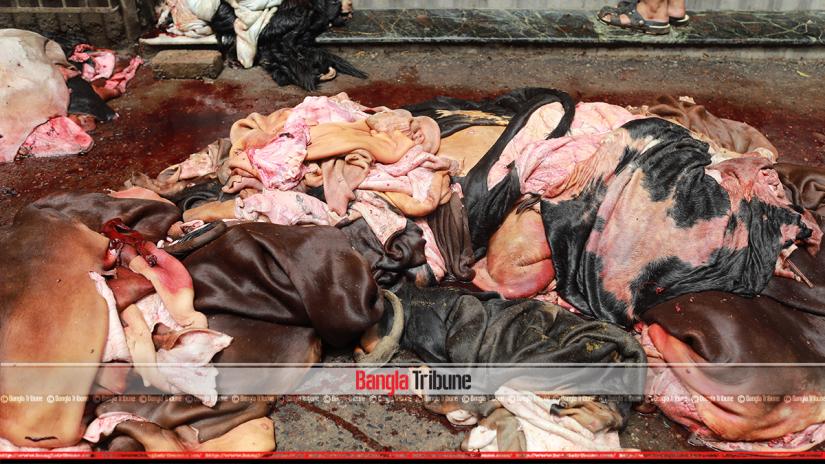 Every year, Qawmi madrasas in the country are alert in collecting raw hide from sacrificial animals during Eid-ul-Azha.
Every year, Qawmi madrasas in the country are alert in collecting raw hide from sacrificial animals during Eid-ul-Azha.
The money from the sales of the hides powers the financial cycle of the madrasas. The money earned from such sales is spent for the education and upkeep of students from underprivileged backgrounds.
However, this year, the madrasas are facing huge financial loss due to the low price of rawhide.
All Qawmi madrasas have Lillah boarding where orphans and helpless students can get free meals. In the past, the food cost for 3-4 months could be financed from the sales of hide. But with the low price of rawhide, catering for underprivileged children may be hampered.
Education secretary of Jamia Karimia Arabia Madrasa in Rampura, Mufti Hemayet said: “Due to the low price of rawhide, the madrasa IS facing a huge loss; the upkeep of children from poor backgrounds will be difficult.”
Last year, the madrasa collected 1,000 hides and sold them for Tk 1,000 each. 'This year, more than 1,200 skins have been collected but failing to get a buyer, we gave them to the hoarders', said Hemayet.
They promised to pay later based on market rates, he added.
People handling such issues in Qawmi madrasas say that the leather market is controlled by a syndicate.
“The rawhide needs to be processed fast and sent to the tannery, which gives the control to tannery owners; taking this chance, they have formed a syndicate to bring down the price of rawhide.”
Amir of Hefazat e Islam, Nur Hossain Kashemi, said: “The leather syndicate was formed 10-12 years ago and at that time, the government said that rawhide exports would be allowed; if hide is exported, the syndicates will automatically break.”
Moulana Munir Ahmed, a teacher of Jamia Madania Baridhara Madrasa, observed: “The government is interested to preserve the interests of the businesspeople not the masses; once the ban on export is withdrawn another class of rich people will take over.”
Despite the loss faced by Qawmi madrasas, no steps can be taken since 55 leading figures of Qawmi education are in Saudi Arabia to perform Hajj.
 National
National
30755 hour(s) 15 minute(s) ago ;
Morning 06:10 ; Saturday ; Apr 20, 2024
Low rawhide price pushes madrasas towards financial difficulty
Send
Aditto Rimon
Published : 07:30, Aug 16, 2019 | Updated : 07:30, Aug 16, 2019
Published : 07:30, Aug 16, 2019 | Updated : 07:30, Aug 16, 2019
0 ...0 ...
/tf/
Topics: ExclusiveTop Stories
- KOICA donates medical supplies to BSMMU
- 5 more flights to take back British nationals to London
- Covid19: Rajarbagh, Mohammadpur worst affected
- Momen joins UN solidarity song over COVID-19 combat
- Covid-19: OIC to hold special meeting
- WFP begins food distribution in Cox’s Bazar
- WFP begins food distribution in Cox’s Bazar
- 290 return home to Australia
- Third charter flight for US citizens to return home
- Dhaka proposes to postpone D8 Summit
Unauthorized use of news, image, information, etc published by Bangla Tribune is punishable by copyright law. Appropriate legal steps will be taken by the management against any person or body that infringes those laws.
Bangla Tribune is one of the most revered online newspapers in Bangladesh, due to its reputation of neutral coverage and incisive analysis.
F R Tower, 8/C Panthapath, Shukrabad, Dhaka-1207 | Phone: 58151324; 58151326, Fax: 58151329 | Mob: 01730794527, 01730794528


